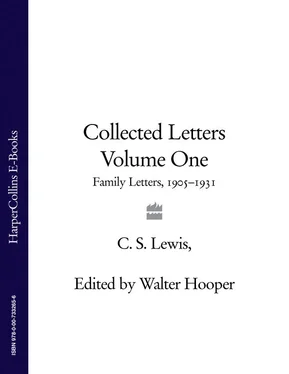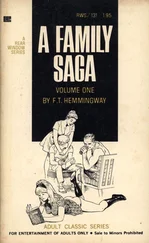79Robert Heard Ewart (1879-1939). See The Ewart Familyin the Biographical Appendix.
80Carrie Tubb (1876-1976) was an English soprano much in demand as an oratorio singer. She was a favourite singer of operatic excepts, notably the final scene of Richard Wagner’s Götterdämmerung.
1915 
TO HIS FATHER (LP IV: 285-6):
[Gastons
24? January 1915] 1
My dear Papy,
I have arrived and settled down here in due course, and everything progresses favourably, including the German. We had it snowing hard all day on Thursday, beautiful snow and bright frosty sun until Saturday, and are now enduring the thaw. (Yes; I did change my socks. No; there are no holes in my shoes. Yes, thanks, I have plenty of warm underclothing.) I hope you have by this time got rid of your cough, and, did I not know the utter futility of so doing, I should advise you to be careful. However, as you will doubtless reply, my playing the anxious adviser of a patient who will not obey orders, is rather like Satan rebuking sin. 2 But all joking apart, do take any care of yourself that you reasonably can, and don’t refuse harmless precautions for no reason.
That Smythe boy, the brother of the one who lost his arm, was home for a few days and lunched at Gastons on Wednesday: he tells us that his brother is going out again as soon as he is better–so hard are we pressed that even cripples whose worth is known will be taken in some departments! What this argues as to the paucity of our troops in general, and the old officer’s contempt for the new volunteers who are to come, you will readily imagine. Smythe also directly contradicts the reports of the newspapers about the Indian troops whom he declares to be worthless, and absolutely unfitted for trench fighting: they have too, an unpleasant habit of not burying their dead, which contributes a good deal to the discomfort of European men anywhere near. But of course this is only one man’s story, and the longer this war goes on the less credulous we become. Kirk has many amusing reflections, as usual, on the present crisis, especially when the curate came in yesterday at afternoon tea and told a number of patriotic lies about Germany and the Germans. Kirk then proceeded with great deliberation to prove step by step that his statements were fallacious, impossible, and ridiculous. The rest of the party including Mrs. K., Louis, and myself enjoyed it hugeously.
Thanks for my Classical Library which I have received. In the course of the week I shall return Munro’s Iliad I-XII 3 which was not asked for: after which fact has been explained gently to Carson you will tell his remains to give you in exchange Merry’s Odyssey I-XII, 4 which was asked for. Kirk also tells me to ask for ‘Tacitus’s Agricola’, 5 any edition except Macmillan’s.
your loving son,
Jack
TO ARTHUR GREEVES (W/LP IV: 286-7):
[Gastons
26 January 1915]
My dear Arthur,
I wonder would hunting be good sport? The matter ocurred to me, not because I am really interested in it, but because I have just returned from a compulsory chase–trying to find out where the bit at the top of page 2 of your letter was meant to come in. Now, faint & perspiring, I am enjoying the fruits of my labours.
By this time you will probably have finished ‘Villette’. 6 What do you think of the ending? I can just hear you saying, ‘Cracked–absolutely!’. It certainly is most unsatisfactory, but yet a touch of genius. I fancy it is the only novel in existence that leaves you in a like uncertainty. Merriman is a far cry from the Brontes. Both of course are good, but while they should be sipped with luxurious slowness in the winter evening, he may be read in a cheap copy on top of a tram. And yet I don’t know: of course his novels are melodrama, but then they are the best melodrama ever written, while passages like the ‘Storm’ or the ‘Wreck’ in the Grey Lady, or the Reconciliation between the hero and his father in ‘Edged Tools’, are as good things as English prose contains. 7
The remark about the Maiden Islands was really quite smart for you. You might have it framed? Also such gems of orthography as ‘simpathise’ and ‘phisically’ which appeared in your last correspondance, tho’ of course I, being almost as bad, have no right to complain.
The weather here is perfectly damnable, there having been scarcely a couple of hours’ sunshine since I left home. Now that my friends have gone, there is nothing to do but sit & read or write when it rains, and consequently I have nearly finished The Morte D’arthur. I am more pleased at having bought it every day, as it has opened up a new world to me. I had no idea that the Arthurian legends were so fine (The name is against them, isn’t it??) Malory is really not a great author, but he has two excellent gifts, (1) that of lively narrative and (2) the power of getting you to know characters by gradual association. What I mean is, that, although he never sits down–as the moderns do–to describe a man’s character, yet, by the end of the first volume Launcelot & Tristan, Balin & Pellinore, Morgan Le Fay & Isoud are all just as much real, live people as Paul Emanuel or Mme Beck. 8 The very names of the chapters, as they spring to meet the eye, bear with them a fresh, sweet breath from the old-time, faery world, wherein the author moves. Who can read ‘How Launcelot in the Chapel Perilous gat a cloth from a Dead corpse’ or ‘How Pellinore found a damosel by a Fountain, and of the Jousts in the Castle of Four Stones’, and not hasten to find out what it’s all about?
To obey my own theory that a letter should tell of doings, readings, thinkings, I will conclude by saying that I am trying to find some suitable theme for my Celtic narrative Poem: there are heaps of stories but mostly too long. Fare-thee-well.
yours sincerely
C. S. Lewis
N.B. This was written on the same day as I got your letter, but I forgot to post it. Mille pardons. J.
TO ARTHUR GREEVES (W):
[Gastons
2 February 1915]
Dear Arthur,
The first essential point for a letter writer to master is that of making himself intelligable to his reader. Or, to come down from my high horse, what was the (it?) in brackets meant for? A thousand pardons for my dulness, only I utterly failed to follow your wheeze: please explain in your next epistle.
I am deep in Morte D’Arthur by this time, and it is really the greatest thing I’ve ever read. It is strangely different from William Morris, although by subject & language they challenge comparison. One is genuine, and the other, tho’ delightful, must, of course, be only an artificial reproduction. You really ought to read your copy of it, or at any rate parts of it, as the connecting chain between book and book is not very tightly drawn. I don’t think it can be the Library Edition, that those people have sent me, as it does not agree with your description at all, being bound in plum-coloured leather, with pale-blue marker attached. However, partly through my keenness to read the book & partly because it was a very handsome binding, I did not send it back.
By the way, is there anything the matter with my father, as I have not heard from him for some time now? Or perhaps it is only this submarine nonsense that makes the conveyance of letters uncertain: which reminds me, that, though I do not usually take much interest in the war, yet it would be unpleasantly brought home to me if I had to spend my holydays in England. 9
Your remarks á propos of loneliness are quite true, and I admit that what I said before was rather not, as uncongenial companions produce in reality a worse desolation than actual solitude.
Читать дальше













